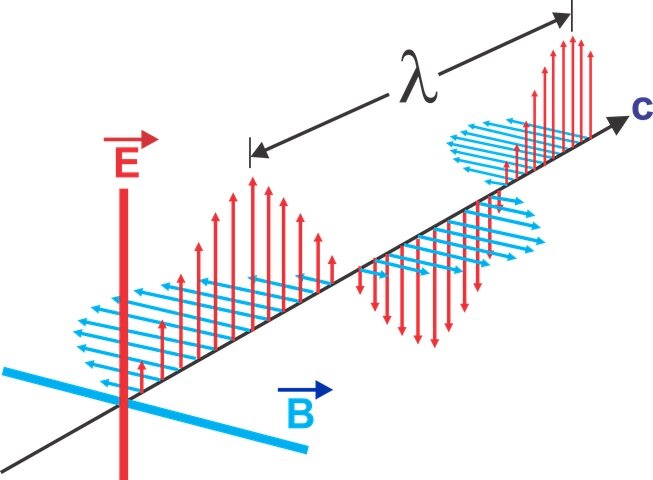What is the Difference Between EMF Testing and EMR Testing?
By James Finn ©2014, edited ©2025
For those few brave and informed people who are first learning about electromagnetic radiation, although technically incorrect, the common vernacular, due to the internet, is EMF (Electromagnetic Field Radiation), and EMR (Electromagnetic Radiation) are pretty much the same.
But if you want to go deeper, please read on.
EMF (electromotive force) is the electrical potential (voltage) a moving magnetic field or electrochemical battery produces in physics. EMF equals the reactive potential difference between terminals (connection points) when electrical current is not flowing over a conductor. The typical formula for Electromotive Force is: E = W/Q (where E = the electrical potential difference between terminals; W = Work done moving a charge from one point to another; Q = Quantity of charge in coulombs).
This formula relates to Lenz’s Law: Lenz's Law states that a magnetic field induced by an electrical current produced by a change in magnetic flux (Faraday's Law) counters the change in flux. In other words, a changing magnetic field can produce an electric current, and conversely, an electric current can produce a magnetic field. Here, is a simple formula that explains this clearly; EMF = ΔΦ/Δτ (where Δ = change, Φ = flux, τ = time)
In measuring and mitigating non-ionizing radiation, EMF has come to mean electromagnetic field radiation, sometimes abbreviated as EMR or electromagnetic radiation. Electrical Engineers will abbreviate this as EM.
When conducting electromagnetic field (EMF) testing, the context of the request, our client's purpose and goals, and the electromagnetic environment or equipment under test (EUT) will indicate the specific what, when, how, and why we will measure.
Electromagnetic fields are usually measured as either (1) single-axis measurements rotationally orientated on a three-dimensional model, a method used when accuracy and precision are required to ascertain as much detail as is possible, or (2) a real-time three-dimensional triaxial X, Y, Z vector array measurement using either:
True Root Mean Square = true-RMS = √((X² + Y² + Z²) ÷ 3)) “3” can be substituted by n, the number of ordinates.
Magnitude of the Vector (XYZ)= VM = √ (X² + Y² + Z²)
Magnitude of the Vector Sum* = VSM = √( X²Real + X²imag + Y²Real + Y²imag + Z²Real + Z²imag) ÷ n)
imag (imaginary number) as z = (a + bi)
a = Real x-axis, bi = complex imaginary y-axis number determined by the polarity coordinate components
(Usually, these calculations are provided within your meter’s programming or software. I wrote these formulas so that you can easily calculate these measurements with only a single-axis gaussmeter or magnetic sensor probe. They are typed the same way you would type the formulas into your Texas Instruments calculator.)
A triaxial Magnitude of the Vector (XYZ), calculated within the Gigahertz Solutions NFA 1000 Near-Field Analyzer, is used for a quick and functional assessment by Professional Electromagnetic Radiation Specialists. They are often tasked with identifying emission source points and assessing a field's size, shape, frequency, and magnitude. They then recommend various remedial options to clients for “good, better, and best “ solutions to mitigating localized radiation levels.
EMF Testing implies an unbiased measurement of an electromagnetic field's power density or flux magnitude, frequency range, size, and shape. Often, one should take into consideration time and magnitude derivatives. The power of an electromagnetic field is generally strongest near the point source and then weakens with distance. This rule of thumb can deviate with reflection rates and dense multipath co-signaling. With frequency levels, the field's energy increases proportionally as frequency increases (Planck's Law). The rate of frequency fluctuation and phase noise or jitter also play into the assessment equation.
E = electromotive force, B = magnetic induction and direction of the magnetic rotation, λ = wavelength, c = particle moving at the speed of light / total electric current and its direction
An electromagnetic field unifies charged photon particles with a corresponding magnetic flux, forming a wavelength vibrating at a frequency or band of frequencies. Interesting effects seldom mentioned are that all EMFs emit light, either visible or invisible, and sound, either audible or inaudible.
An AC magnetic field with frequencies just above the electricity frequency in your home (60 Hertz in the USA and Canada, 50 Hertz in most of the world) is used for communicating with submarines and other submersibles. Signals can penetrate saltwater 10,000 feet below sea level and into the ionosphere. Nuclear radiation is contained by both seawater and the ionosphere. This ability is why ELF, Extremely Low Frequencies, is used for communication through more challenging mediums such as water, concrete, and Earth. Another rule of thumb is that the lower the frequency, the more characteristic the penetration of the field.
Many physicists begin a general introductory lecture on EMR, electromagnetic radiation, by distinguishing how electromagnetic forces can affect an atom. Ionizing radiation or nuclear radiation effects change an atom by having enough energy to detach one or more electrons from it. Non-ionizing radiation does not detach a particle from an atom but can split an electron’s spectral lines, affecting its quantum orbit and spin.
When most people think of radiation, they think of nuclear radiation, such as X-rays and gamma rays, which are ionizing radiation that can penetrate the human body and, at elevated dosimetry, can cause harm. The term dosage level is often used when speaking of flux or power density in this context. Most people do not realize that much of the electromagnetic spectrum's non-ionizing bandwidth, either DC or AC, can also penetrate the human body to one degree or another, with the amount of exposure depending on the radiation flux magnitude, frequency, and time duration.
On an atomic level, non-ionic radiation causes shifts to an electron's quantum orbit; the electron spin, or both, inside an electrical conductor will cause noise or transient harmonics. Etiam, the changing of an electron's quantum orbit, the electron spin, or both inside an atom of a biological cell, is where we see how living cells can be affected. One natural result is the reversal of a cell's polarity, thereby causing cells to relinquish electrons, oxidize, shift from alkaline to acidic, sometimes becoming inflamed, mutate, or even experience premature apoptosis (cell death).
Our general observation from countless assessments indicates that factors such as gender, body mass, age, and health status should be considered when discussing dosage tolerance or determining reference dosimetry. Women tend to be more sensitive to the effects of electricity/ electromagnetism than men. (This may be because women’s bodies generally contain more water content by the relative percentage of body mass than men’s bodies. We do not know why, but more than 60% of those complaining about EMF sensitivity to us have been women.) Many people present with sensitivity symptoms have Lyme disease, chemical sensitivities, multiple allergies, or are prone to sunburn easily. Persons with previous exposure to extreme electromagnetism levels for an extended duration will often complain of having developed sensitivity to EMF. Finally, the elderly and the frail also appear to present real sensitivity. We never doubt someone’s claims of being sensitive to EMF, but there have been a few occasions where a client shows inconsistencies. There may be various EMF sensitivities where some folks are only sensitive to a specific frequency bandwidth. If this is the case, the prevailing theories on characteristic EMF sensitivity should be reconsidered. That said, much more scientific work is needed in this study area.
Although a person with a larger mass will register a higher epidermal voltage than someone with a lesser mass standing in the same spot, those with a larger mass tend to feel less affected by electromagnetism. Children and older adults seem more affected by strong radiation levels than teenagers and young adults, especially regarding magnetic fields and the magnetic component of radiofrequency radiation. Dosage levels could be used for non-ionizing radiation, but this practice is often frowned upon because of the disparate scientific literature. (Disparate only because of “bad” science, in my opinion.) Of course, DC and AC non-ionic radiation can cause electromagnetic interference to sensitive electronic equipment.
Another possible result from over-exposure to electromagnetic radiation (engineered or native EMF) is the effect on protein receptors and electrical signaling channels for cellular pathways, such as the effect on calcium ion (Ca+) motility, potassium (K+) channels, and transduction pathways in neurons.**
* The Vector Sum Method is used in physics calculations and some modeling programs, such as SimuTech, where imaginary numbers are employed to consider the vector phase.
**Cited from works by Dr. Martin Pall.
Note: The “o” in µo, mu-naught, should be a subscript, not a full-size “o.” Our website platform does not accommodate subscripts.



